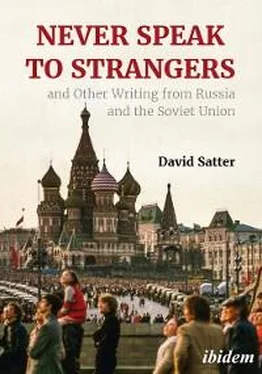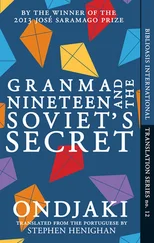He said that the K family owned a lumber yard which was expropriated after the revolution, but that they continued to live in the house on Sovetskaya Street until it was also requisitioned in 1927.
Shortly after collectivisation began, the K family left Chernoble. It was at this time, perhaps because of the Stalinist terror, that the letters from Shaya K stopped arriving. He then moved to Kiev where he got a job buying equipment for a collective farm and when the Nazis invaded the Ukraine, he and his family were evacuated.
The family returned to Kiev after the war and Shaya K died peacefully in Kiev in the 1950s, a “kindly old man” in his 80s.
Satisfied at last with our visit, we left Chernoble for Kiev that evening and then went by train to Moscow. Several weeks later, however, an article appeared in Pravda Ukraina , the Ukrainian newspaper, accusing me of having been rude and abusive to officials. The authors never called me for comment but they did manage to reach my Intourist driver who told them if he had his way, I would be thrown out of the country.
It may be a long time before another foreigner visits Chernoble but the secretiveness and xenophobia that Soviet officials showed during this episode were all the more puzzling because they were so unnecessary. Chernoble makes a favourable impression.
The peace and apparent lack of racial hatred in Chernoble may only reflect collective exhaustion, but in a world which underwent civil war, collectivisation, famine and Nazi occupation, I think they must be counted a form of progress too.
Financial Times, Saturday, September 29, 1979
Russia assumes no Soviet citizen will return
home of his own free will: From Moscow,
David Satter reports on defections
The Crime That Can Only Exist
Behind Closed Borders
Defection is probably the quintessential Soviet crime. Whenever prominent Soviet sportsmen and artists make the decision to defect, it has a disproportionate impact on their society, and only in a society like the Soviet Union could the crime exist at all.
The latest defections have been those of Oleg Protopopov and his wife, Lyudmilla Belousova, two figure skaters who are extremely well known here. There followed Leonid and Valentina Kozlov and Alexander Godunov, the Bolshoi Ballet dancers who defected during the troupe’s tour of the U.S.
The defections within the space of a month of two skaters who were double Olympic gold medallists and three stars of the Bolshoi, which had never lost a principal performer through defection before, has more than counterbalanced Soviet satisfaction over the return of Lyudmilla Vlasova, Mr. Godunov’s wife, who decided not to remain in the U.S. with her husband.
Soviet citizens—even if they speak only Russian—are startled by the freedom, diversity and sheer material prosperity of the West. To make sure that increasing travel abroad by Soviet citizens, whether on business or in official exchanges, does not result in continual defections, the Soviet authorities employ a series of policies. These are normally effective because they operate on the assumption that no Soviet citizen will return home of his own free will.
As a preliminary, but as a matter of course, people who are allowed to travel are carefully selected for visible career success, personal conformity and political reliability. Artists who may be called upon to perform abroad are kept under close surveillance inside the Soviet Union by officials of the Ministry of Culture and by the KGB through informers. They do not travel if their attitude or behaviour suggest they may be unreliable.
Soviet officials or scientists who go abroad must have a recommendation from an immediate superior, who will face retribution if they defect and so is inclined to be cautious. Those who have been abroad and want to go again try not to show too much enthusiasm for the places they have visited.
Since, in the final analysis, it is difficult to judge any individual’s innermost motivation, a high premium in every profession is placed on Communist Party membership, or membership in communist youth organizations. Unfortunately, this may only encourage hypocrisy. Four of the five most recent defectors—the Kozlovs, Mr. Protopopov and Miss Belousova—had given the impression of being active, enthusiastic communists.
The Soviet authorities are now reported to be involved in a concerted effort to review their means of presenting defections. Lest the five most recent defections set off a chain reaction the Soviet Culture Ministry said on Thursday it had cancelled a month-long tour of the United States by the 110-member Soviet State Symphony-Orchestra, which was to have begun next week.
Once selected Soviet citizens are finally allowed to go abroad, efforts are made to limit their movements and inhibit their curiosity. They are generally advised that the police of the country they are visiting may seek to compromise them.
Wherever possible, Soviet citizens travel in groups. These are usually divided into “teams” of 10, with one person responsible for himself and the nine others. The group as a whole is accompanied by KGB men who represent themselves as interpreters or officials. But for the benefit of anyone contemplating defection they post themselves, for example, at the front and rear of the group every time it enters a tour bus.
In such an uneasy situation, hotel rooms and meals are arranged by the sponsoring Soviet organisation and spending money is kept to an absolute minimum. Since meals are taken together, anyone’s absence is immediately noticed and many Soviet citizens are unaware that they are not subject to Soviet law while abroad according to which defection is treason, carrying a maximum penalty of death.
There are limits to a regime’s ability to control its citizens once they are abroad. The most effective bar to defection remains the rule that when Soviet citizens travel abroad, they must do so without any members of their immediate family. The traveller knows that if he defects, he will never see his family again.
Rudolph Nureyev who was with the Leningrad Kirov Ballet before his defection in 1961, has not been able to see his mother and sister despite a request to the Soviet authorities on his behalf by Sir Harold Wilson, the former British Prime Minister.
Victor Korchnoi, the chess grand master who defected to Holland in 1976, has not seen his wife and son. Lyudmilla Agapova, wife of a Soviet sailor who jumped ship in Sweden in 1974, tried and failed to join her husband through an escape arrangement with the pilot of a private plane.
Miss Vlasova was aware last month when she made her decision to return to the Soviet Union that staying in the U.S. with her husband would have meant never seeing her mother again. She was quickly separated from the group and put on a plane, not only to prevent her from defecting too but also so that the traditional punishment for defectors, separation from wife and family, would, in the case of Mr. Godunov, go into immediate effect.
The combination of practices affecting Soviet citizens who go abroad do have the effect of making defection a relatively unusual occurrence. But the five most recent defections, like the earlier defections of Mr. Nureyev, Natalia Makarova, Mikhail Baryshnikov, the eminent Soviet conductor, Kiril Kondrashin and Viktor Balenko, who eluded two sets of air defences to flee in the then top secret MiG-25 to Japan, are a serious embarrassment to the Soviet Government.
The difficulty stems from the Soviet Union’s ideological pretensions. Aaron Vergelis, an officially approved Jewish writer, wrote recently in connection with the defections that the socialist and bourgeois worlds are markedly different and that no capitalist country can boast “the unity and complete identity of views” which exists in the Soviet Union.
Читать дальше












